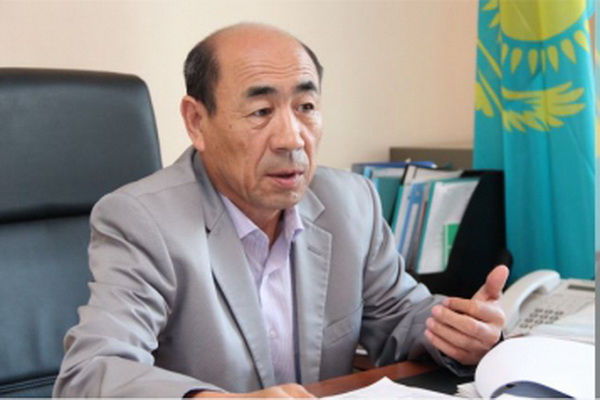President of Kazakhstan's Union of Farmers Auezkhan DARINOV:
KAZAKHSTAN HAS ALL NECESSARY PREREQUISITES FOR BOOSTING THE NUMBER OF COLLECTIVE AND FAMILY-OWNED FARMS

Heavy rains have caused the agricultural producers a lot of trouble this year. President of Kazakhstan's Union of Farmers Auezkhan DARINOV shared with Interfax-Kazakhstan his vision of how the farmers should be compensated for the losses, spoke about the prospects of the agricultural sector of Kazakhstan and gave his forecast of wheat harvest and exports this year.
- The grain harvest is nearly over. This year it has been hindered by bad weather. What is your forecast of this year's grain yield?
- Judging from the information provided by the Ministry of Agriculture and the regional departments of agriculture, the grain had been harvested on 14.490 million ha by November 17, 2014 or 96.6% of all area under crop, which is 14.994 million ha this year. The farmers have threshed 18.311 million tonnes, the average yield coming to 1.26 tonnes per ha. This means that as much as 504,000 ha under crop has not been harvested yet. I would like to draw your attention to some discrepancy in the official figures. The gross yield of grain and leguminous crops had totaled 16.758 million tonnes by November 1, 2014 according to the Ministry of Agriculture but the figure provided by the Statistics Committee of the Ministry of National Economy for the same period is 14.136 million tonnes or 2.622 million tonnes less. Why is the difference? According to our estimates, the harvested area is much less than reported by the government agencies. We also have some doubts about the reported harvest and average yield numbers. The Union of Farmers earlier brought the problem to the attention of the National Chamber of Entrepreneurs which, in turn, informed the government. Unfortunately, there has been no response.
- According to the Ministry of Agriculture, the grain export potential is estimated at seven million tonnes this year. Do you agree with the forecast?
- This is the question! To begin with, I must remind you that Kazakhstan needs about two million tonnes of wheat seeds, of which 868,000 tonnes has already been stocked but the other 1.2 million tonnes has yet to be supplied, mainly from the 3rd grade grain harvest which has been scarce this year. As you may know, 4th and 5th grade grain is not suitable for export. In other words, everything will depend on the domestic consumption and the seed stock formation, which may be rather problematic, especially in the Aktobe, Pavlodar, North Kazakhstan and Kostanai regions.
- The Central Grain Holding was organized more than a year ago. How many agricultural producers have joined the Holding? What is the progress achieved by the organization?
- The Central Grain Holding (CGH) was created following the presidents instruction given on June 21, 2013 by an agreement concluded between JSC National Company Food Corporation and Kazakhstan's Union of Farmers. The CGH is not a legal entity--it was registered as association. The CGH was organized to coordinate grain purchase and sales on the internal and external markets. The association numbers 110 agricultural companies as its members. However, the operation of the CGH is hindered by a number of factors, one of them is the current anticorruption law which does not allow the Food Corporation to act as priority purchaser of grain from the CGH members for the government and commercial reserves. All such obstacles are under discussion now and I am sure they will be overcome soon.
- Bad weather in the south regions also hampered the cotton harvesting this year. What is your expectation of this year's cotton yield and export forecast?
That is true, the bad weather in the south of the country had a negative impact on cotton harvesting. The cotton producers in the Makhtaaral District of the South Kazakhstan Region harvested about 1-1.2 tonnes of cotton from each hectare. This year's cotton is of very poor quality. I doubt that it can be exported. Maybe, only a small volume of it will be exported to China, as in previous years.
The purchase price of cotton ranges between 70 and 77 tenge per kilogram. The cotton cultivation costs are about 100,000-120,000 tenge per ha, including 22,000 tenge per ha worth of government subsidies. It costs about 30,000-35,000 tenge to pick manually one tonne of cotton. Now you can calculate yourself how costly our cotton industry is.
- The National Chamber of Entrepreneurs suggested earlier that KazAgro Holding should extend the loans for agricultural producers that have been adversely affected by bad weather this year. Do you agree with their suggestion?
In our opinion, the problem cannot be resolved through extending the agricultural loans alone. I will explain. Typically, it costs 25,000-30,000 tenge to grow one tonne of grain in the northern regions of Kazakhstan, with the yield usually coming to about one tonne per ha. According to our estimates, an average farm will earn about 5,000 tenge per ha. Given the bad weather this year, we believe that the government should compensate the difference between the production costs and the earnings. The farmers are also struggling to dry the harvested grain, which requires additional costs and a lot of effort. We expect the next year to be even more difficult. We will have to work within the Eurasian Economic Union competing with the Russian and Belarus agricultural producers.
- What is the status and prospects of the agricultural sector of Kazakhstan?
The agricultural industry is going through hard times as the industry has not developed enough to become steady and sustainable. The official statistics proves this statement: the agricultural sector only accounts for 6.7% of GDP today compared with 27% in 1994.
There has been no increase in exports of agricultural products, except for grain. Most of the food products in our shops are imported goods. According to some experts, this is because the government's support is focused on large agricultural producers leaving out small-sized farms, which is in conflict with the fundamental tenets of a market economy and which creates an imbalance in the competitive environment.
Kazakhstan has all necessary prerequisites for boosting the number of collective and family-owned farms. As the number of family farms grows, the social and economic problems and the food security issues in the country will be handled more efficiently.
The Kazakh president and the governments pay due attention to the agricultural sector. For instance, the government adopted the Agribusiness-2020 program in 2012. In his addresses to the nation, the president sets goals and objectives for the agricultural industry, which are in line with the expectations of the agricultural producers. Kazakhstan's Union of Farmers continues defending the interests of farmers. We do hope that the Central Grain Holding will help the Kazakhstani farmers to conclude long-term grain purchase contracts in the future.
November, 2014
© 2025 Interfax-Kazakhstan news agency
Copying and use of these materials without reference to the source is prohibited
Archive





